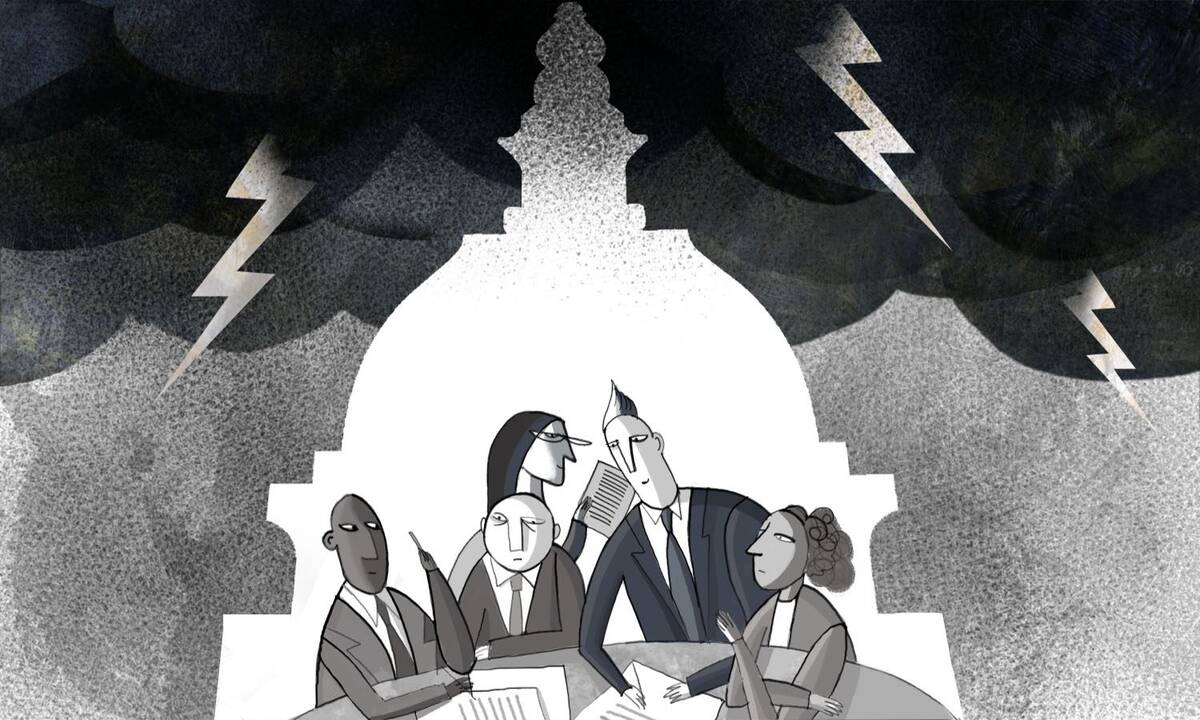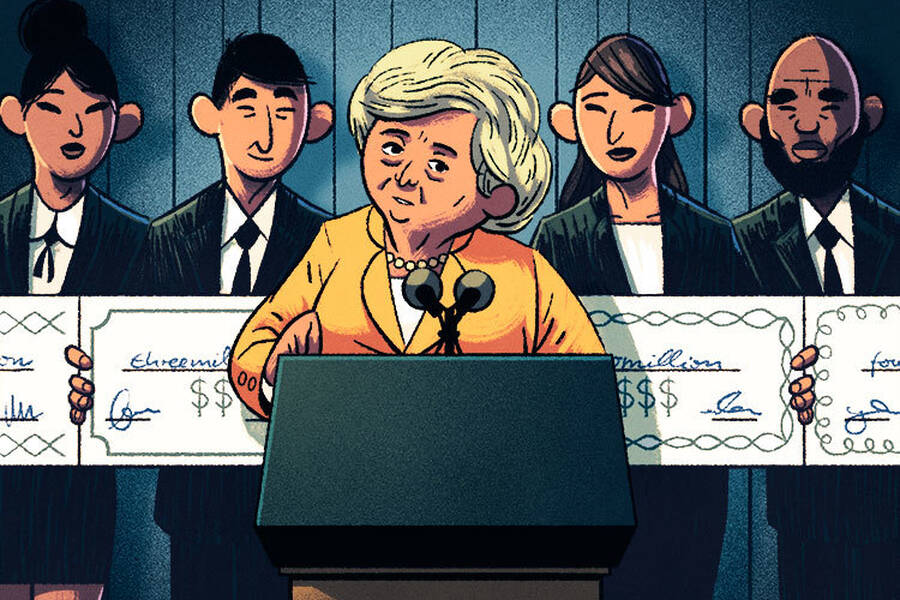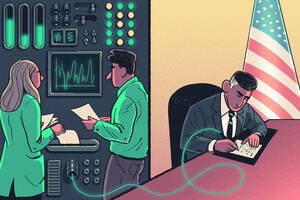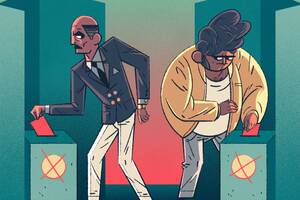Politics & Elections Policy Jan 3, 2019
Politicians Vote Differently When Journalists Aren’t Watching
During natural disasters, the media spotlight shifts—and special interests benefit.

Yevgenia Nayberg
When a major tornado, landslide, or flood devastates a region, it can dominate national news coverage for a few days, pushing out stories that would otherwise get more attention. With cameras pointed elsewhere, do politicians change their behavior?
A new study suggests that politicians may take advantage of the temporary distraction to cast votes that are not necessarily in their constituents’ best interests. By analyzing media broadcasts, the researchers found that journalists’ coverage of politics dropped during and immediately after natural disasters—and during this window, members of Congress were more likely to align their votes with the preferences of major donors.
“Natural disasters crowd out other kinds of reporting in the media,” says study coauthor Jörg Spenkuch, an associate professor of managerial economics and decision sciences at Kellogg. “And politicians react to the reduced scrutiny by favoring special interests.”
The research can’t conclusively show whether the reduced media coverage allowed legislators to be swayed by donor money, or whether they wanted to support special interests anyway and simply felt freer to do so. But whichever is the case, Spenkuch says, “special interests are more likely to get their way.”
To Spenkuch, the finding supports the idea that scrutinizing politicians more closely can encourage better behavior. “If we, as constituents, want our representatives in Congress to serve our interests, we need to monitor them,” he says.
Do Special-Interest Donations Buy Votes?
It may seem obvious that taking money from special-interest groups will influence lawmakers’ votes. But, Spenkuch says, the evidence for this claim is less convincing than you might think.
For instance, consider a well-known 1982 study suggesting that U.S. legislators who received money from the dairy lobby were more likely to vote for policies that propped up the price of milk in the following year. On the surface, it may seem like solid evidence of a quid pro quo. But, Spenkuch points out, it is not clear whether those lawmakers would have voted in favor of the dairy lobby even if they had not received money. Indeed, special-interest groups target their donations to politicians who already support their priorities.
“If we, as constituents, want our representatives in Congress to serve our interests, we need to monitor them.”
Even when researchers examine the connection between special-interest donations and votes more closely, the evidence of vote buying isn’t compelling. In studies that control for factors such as a politician’s ideology or constituents’ preferences, the link is “surprisingly weak,” Spenkuch says.
On the other hand, research does suggest a link between media scrutiny and political action. One study, for instance, found that in districts where members of Congress receive more local newspaper coverage, they better serve their constituents’ interests by participating in more congressional hearings and voting less along party lines. However, it isn’t clear whether these differences arise because media coverage motivates lawmakers to change their behavior, or because well-informed voters elect better representatives.
Spenkuch and his coauthors wanted to look specifically at whether politicians tend to favor special interests when given the opportunity. By studying natural disasters, they could see whether legislators took advantage of changes in news coverage to vote differently.
How Weather Affects News Coverage
Spenkuch and his collaborators, Ethan Kaplan of the University of Maryland and Haishan Yuan of the University of Queensland, first wanted to know if stations did, indeed, reduce their coverage of politics during natural disasters. After all, “there’s only so much time on the evening news,” Spenkuch says.
The researchers obtained data from the Vanderbilt Television News Archive, which contains more than a million recordings of daily national news broadcasts from the major television networks, as well as short written summaries of each news segment. The team applied IBM Watson artificial intelligence software to those summaries to determine whether each segment was about government and politics, or something else.
For information about natural disasters, Spenkuch’s team turned to a database at the Centre for Research on the Epidemiology of Disasters, maintained by a university in Belgium. The researchers zeroed in on 200 of the largest natural disasters (such as hurricanes, tornadoes, floods, and landslides) in the United States between 2005 and 2017.
The researchers found that on the day of a disaster and the two following days, the media’s coverage of politics dropped slightly, just as they expected. On non-disaster days, the evening news devoted about 9 minutes of every 30-minute broadcast to political issues. But during and immediately after a disaster, the average fell to less than 8.5 minutes.
For the biggest disasters, the effect was more pronounced. For instance, Hurricane Sandy struck the East Coast at the end of October 2012, shortly before the presidential election. On that day, political coverage dropped by 50 percent, “despite the fact that the campaign was in full swing,” Spenkuch says.
Votes Follow the Money
To see how this might affect political maneuvering, the researchers examined voting records and campaign contributions in the U.S. House of Representatives, using data from the watchdog organization MapLight. During periods of reduced media coverage, the team found, lawmakers were more likely to take the position of the donor that had given them the most money. The fact that politicians vote differently suggests that these votes may not be in their constituents’ best interest.
For example, a legislator who received a quarter million dollars from a special-interest group became about 5 percentage points more likely than usual to vote in the group’s favor during and immediately after a natural disaster, Spenkuch says.
“How much special-interest money actually matters for the laws that Congress passes—that hasn’t been answered yet.”
The team considered some alternative explanations for this finding. For instance, perhaps constituents from disaster-stricken districts would be less likely to donate to their representatives’ campaigns in the future, due to the economic distress brought on by the disaster. If so, then a legislator might cater to special-interest groups in the hope of procuring a sizeable contribution to make up for those lost donations, which would explain the result.
But the data do not support this theory. The researchers found that lawmakers from districts unaffected by the disaster also became more likely to vote with special interests when political coverage waned.
Another possibility was that, in the wake of natural disasters, Congress added disaster relief amendments to bills, which made them more attractive to representatives. But when the researchers analyzed congressional speeches, they didn’t see evidence that legislators discussed natural disasters or relief efforts more often during that period—nor did the House pass more amendments than usual.
As far as the researchers could tell, the lack of news coverage, not something else, appeared to be driving the change in voting habits.
The Danger of Declining Political Accountability
The study does not prove that special-interest groups buy politicians’ votes. It is possible that lawmakers simply take advantage of reduced scrutiny to vote the way they themselves want to, and that their own preferences align with the positions of special interests, Spenkuch says. “How much special-interest money actually matters for the laws that Congress passes—that hasn’t been answered yet.”
But the results do support the theory that less scrutiny leads politicians to vote differently. “They are less accountable to their distracted constituents,” says Spenkuch.
He notes that the incentive at play in this study—the opportunity for politicians to avoid negative press—is a limited one. After all, disasters only provide temporary cover. Since Congressional votes are a matter of public record, constituents may find out about them later—and so, when Election Day rolls around, they may still punish legislators for prioritizing special interests.
That being the case, it’s remarkable to Spenkuch that even this minor drop in attention has such a strong impact on lawmakers’ votes. “If they react that much to small changes in incentives, how much would they react to larger changes?” he wonders.
In particular, Spenkuch thinks about the ongoing decline of local newspapers. His findings suggest that this loss of accountability has already influenced politicians’ actions, and that it will continue to do so as more watchdogs disappear.
“The scrutiny that an individual member of Congress feels is applied to him or her may well have gone down,” he says.



